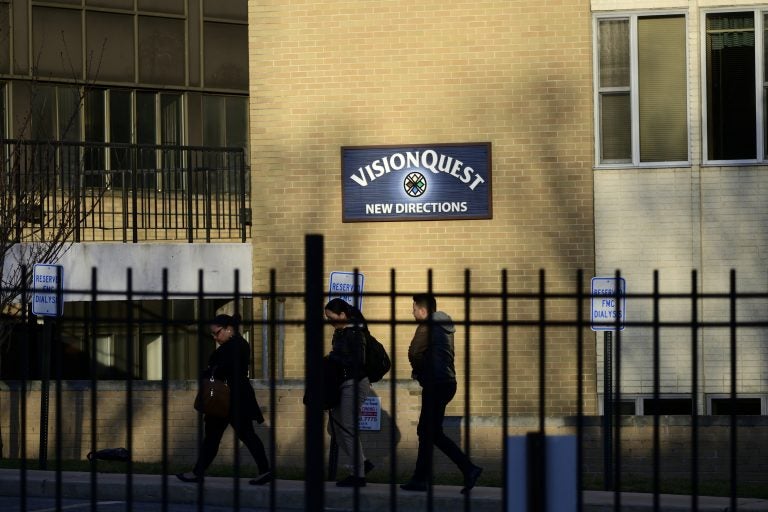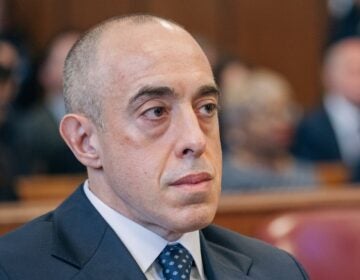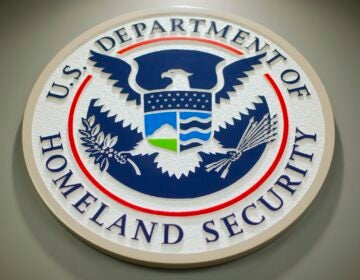Judge: Philadelphia wrongly blocked facility for immigrant minors
VisionQuest, the controversial facility for immigrant minors, has been given the greenlight to reopen after a judge rules zoning permits were wrongly denied.

Several VisionQuest employees are seen departing in small groups from the North Broad Streetlocation to join other employees and members of the community at a March 2019 meeting at the nearby Old York House. (Bastiaan Slabbers for WHYY)
Updated 5:20 p.m.
After months of litigation, a Philadelphia judge has ruled that a controversial immigrant youth center can open in Philadelphia’s Logan neighborhood.
VisionQuest, a for-profit company based in Arizona, has been locked in a legal battle with the city’s law department over whether the facility can legally operate under its current zoning.
Common Pleas Court Judge Paula Patrick wrote that the Philadelphia Zoning Board of Adjustment acted in error when it refused to let VisionQuest open under its existing permit.
“The court finds there was NOT substantial evidence presented in this matter to sustain the decision,” she wrote.
The city could appeal the decision yet again — this time to Pennsylvania’s Commonwealth Court — but officials have not yet said whether they will.
“We respectfully disagree with the court’s ruling,” said city spokesman Mike Dunn. “It is clear, in our view, that VisionQuest’s proposed use of 5210 Old York Road is NOT allowed under its 2010 zoning permit, and that the Zoning Board of Adjustment was correct in its ruling. We are reviewing the ruling, and will make a decision on how to proceed in the coming days.”
Meanwhile, VisionQuest says it will take Patrick’s ruling as a green light.
“Realistically, it can’t be open tomorrow, but we are going to move ahead, and hopefully open the facility as soon as possible, hopefully in a week or two,” said Leslie Gerstein, one of the attorneys representing VisionQuest.
Ironically, the same day that Patrick issued her decision, VisionQuest CEO Mark Contento announced layoffs at the center.
“The Grace Dix Center has been empty for over eight months due to a lengthy zoning battle in the Pennsylvania courts,” he said in a press release, noting about 65 people lost their jobs. “We never anticipated that Philadelphia, a sanctuary city, would be so resistant to our helping these migrant youth.”
Some former VisionQuest staff had raised the alarm about staff behavior in the unopened facility, calling it “not safe” to receive children.
The center is one of a handful of proposed facilities in the Philadelphia region slated to house immigrant children and teens who arrive in the U.S. alone, mostly from Central America, or who are separated from their parents at the border.
The government and its contractors argue that the need for these beds is dire. In the past year, federal immigration authorities have detained more than 76,000 minors traveling into the U.S. alone — more than in any other year on record. Border stations, built to receive single adults, are often ill-equipped to handle the influx.
At the same time, groups that receive federal grants to operate immigrant youth housing programs away from the border sometimes face resistance from local communities, as was the case in Philadelphia. During a neighborhood meeting in March, local civic groups blasted VisionQuest for its track record running a different program out of the same building.
The newly renamed Grace Dix Center, located at 5201 Old York Rd., was slated to open its doors last winter, ready to receive up to 60 boys, ages 11 to 17, in a medium-security setting.
Instead, the city’s Department of Licenses and Inspections issued a violation notice in January, barring the facility from opening without going through a new zoning process.
VisionQuest had previously operated a center for court-adjudicated youth in the same building, but it closed in 2017 after reports of abuse led Philadelphia’s Department of Human Services to pull kids out of the facility.
In her Oct. 31 decision, Patrick said the Zoning Board of Adjustment failed to give VisionQuest a fair shot to prove its case — that housing immigrant teens is similar enough to its earlier work.
“The board unreasonably concluded that the proposed use of the premises in [sic] not consistent with the terms of the existing permit,” she wrote. She also said that one of the city’s experts, an immigration attorney, was “not qualified to testify.”
WHYY is your source for fact-based, in-depth journalism and information. As a nonprofit organization, we rely on financial support from readers like you. Please give today.




